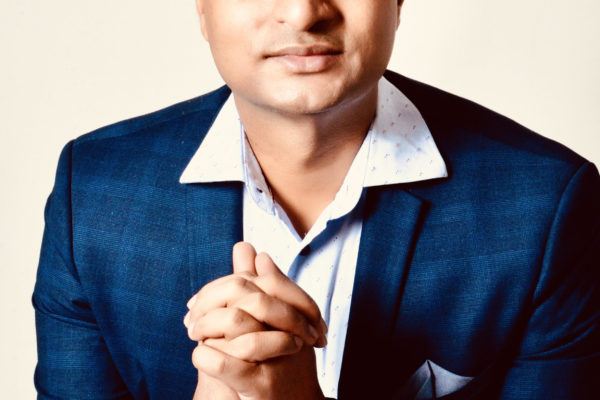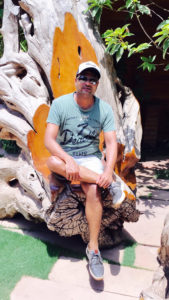Blog: The Other Side of the Hearing Loss Story

Interview with Audiologist, Dr. Raj Sharma
By Carly Sygrove
I am always interested in talking to people with different types of hearing loss, to learn about their lives and to tell their stories. Yet, I have rarely thought about the other side of these stories—the narratives of the hearing healthcare professionals such as ENTs and audiologists who work to help prevent, diagnose, and treat hearing and balance disorders.
Cue an email landing in my inbox from the communications manager at Priority Hearing, a hearing healthcare clinic in India, New Delhi. It was an invitation to interview Dr Raj Sharma, an audiologist who has a passion for providing a holistic approach to hearing healthcare. I was keen to find out more.
During this interview, Dr Raj speaks about his journey into the world of hearing healthcare, what motivates him in his career and why he feels the importance of communication is being recognised now more than ever.
Hello Dr. Raj. Please can you tell me a little bit about yourself?
I’m Raj Sharma. I am a graduate in Audiology and Speech Sciences from one of the prominent institutes of India. I’ve been practising for approximately 15 years. We have a number of clinics in India where, on a regular basis, we are seeing approximately 80 to 100 patients per day that means 10 patients per centre.
I have a beautiful wife and a 7-year-old kid. My wife is also in the same profession as me. Both of us graduated almost at the same time. She is working more with the speech and language cases and the cochlear implants, and I am more into the overall hearing healthcare.
Why and when did you become interested in hearing healthcare?
In India, when we were schooling, our science was not very prominent—we call audiology a young science.
At that time, we had good care for blind people—blind associations and schools for the blind. We had ophthalmology [the scientific study of eyes] and ultimately, they were a little more advanced in their stages. This science [audiology] was somehow lagging behind.
So, what we analysed, when we were graduating, was that the problem in our country and globally was huge, and the [hearing healthcare] service providers tend to be little in number—and that was a core part.
What are your areas of interest in hearing healthcare?
In our society, we take good care of our kids. In the early years, when language development is happening, hearing care is also happening, and the child tends to grow with a significant amount of social communications and adaptability to society.
When we are older, we tend to take care of ourselves less. I started observing the problem that [people] in their golden ages (60s, 70s, 80s) were having hearing loss and not always ready to accept or take care of it. If they’re not taking care of their hearing, it is going to affect the family, because communication is a two-way process.
So, I’m more into geriatric care. Initially, I came into the counselling habit—I used to counsel that family is important because communication is important. [With a decreasing ability to join in with communication] it can gradually lead to avoidance and finally isolation.
We have these strong psychological fundamentals which I felt that most of my patients were not realising, in those age groups. And that motivated me to take care of that age group.
 Can you tell me something that you really enjoy about your job?
Can you tell me something that you really enjoy about your job?
One thing that happens, an individual comes to consult with me, and they hardly talk. Most of the time, instead of the individual, it is the family members that are communicating. And my patient (who I’m going to treat) is completely silent, because of the problem.
Once we provide our services, we feel that there is an immediate shift. So, after fitting [a hearing device], when the next follow-up happens, I have observed that the second individual is silent, and my patient is now the one communicating. They talk about their problem, about their family and what is going on in society. Then we feel that we are connected and that he or she is connected overall. That feeling is really great, no doubt about it and we long to see that happen— the relief and happiness is visible on their face!
And not only that, once we achieve that part, a lot of the time, when people are leaving my clinic, I get a lot of blessings. Blessings are priceless—not even the cost of the treatment and the devices. And that gives us a lot of motivation to work in this fraternity, which is certainly not hip-hop or happening!
Is there a patient that has made an impact on you?
I just saw a patient two days back—she has been a patient of mine for almost 10 years. She lost her husband at the age of 40 and had to take care of her three sons. They all got educated and now they are all into their different careers—one is in Holland, another is in Dubai and the other is in Australia. She is all alone here in India.
It was important for her to be able to talk to her kids, to know about how the kids are doing, and to be connected. Gradually, she had a couple of prominent hearing problems that meant that she couldn’t communicate.
Now, she is living with the help of the hearing sciences, and with a communication device [her hearing is] near normal. So, the happiness she derives from talking to her kids when they call—the happiness of just having the gift of hearing and being able to connect—is priceless. That’s why we say we are not just giving hearing; we are also giving happiness to our patients.
Has COVID-19 affected your work or patients?
One aspect of COVID is that it has enhanced the communication divisions of individuals more. What has happened is that the pandemic has put most of us inside the four walls of our houses. We are, most of the time, with our family members and we are communicating to a larger extent.
I have received a lot of calls from people during the pandemic, that either their son or daughter, or the individual themselves are finding they are having [hearing] problems, which indeed they were not ready to accept before. Now they are spending more time with others, they are releasing the problems more.
Thanks to technology, we can connect with patients and their hearing devices from the office and we can give care remotely.
Do you think that COVID-19 has made people value communication more?
Absolutely. We have started realising the core values including the human conversation. So, COVID has given some great learning which we somehow missed out in these passing times.
I understand that you are in the process of having a book published. Can you tell me about it?
Yes, my upcoming book is called Hearing Matters; I’ll tell you about the first paragraph…
… So, the realisation came the second time I visited Dubai and landed at the airport. I learnt that everything is there to please your sense organs—the cosmetics, perfumes etc. But I could not locate something great for the sense organ which I am dealing with.
When I started exploring what there is for the hearing sense, I realised there are all these electronic gadgets—mobile phones etc.—that we are using excessively, getting addicted to them. We are used to misuse this sense rather than to make use of it.
That was also one of the strong reasons which motivated us when the journey of my clinic began. Hearing is hidden and that’s why it somehow tends to be ignored; we realised we must take care of this ‘hidden sense’.
That’s really interesting. Our sense organs play such a big part in how we interact with the world. Next time I’m at the airport, I’m going to have a look around and have a think about your anecdote!
Do you have a final message to share?
Please, please, please don’t ignore your hearing problems! Prevention is better than management; once you get a hint of the problem, please make an appointment with any of the experts nearby—physicians, ENTs, audiologists. Visit them, to take care of the problem in the early stages. We are all running after our lives; please take care of your hearing.
Thank you for sharing your story.
Thank you. Great to talk to you.
